Highlights of President Biden’s trip to the Middle East
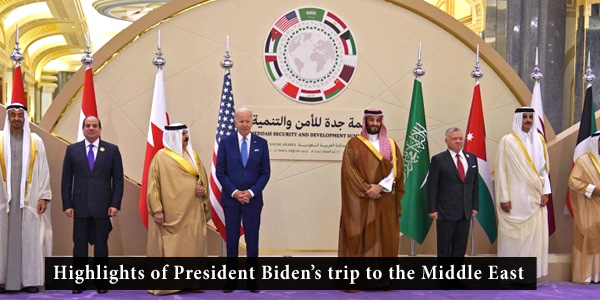
U.S. President Joe Biden landed at Tel Aviv’s Ben Gurion airport on July 13, as he began his four-day trip to the Middle East that included a visit to Israel, West Bank, and Saudi Arabia.
On the first leg of his trip, he made a stop in Israel where he was greeted by the Israeli leadership. During his speech at the airport, he described U.S.’s connection to Israel as ‘bone deep’. He claimed to be a Zionist himself as he stated that “You don’t need to be a Jew to be a Zionist.” The U.S. President also reaffirmed his support to find a two-state solution to the Israeli-Palestinian conflict.
During his stay in Israel, President Biden met with Israeli President Isaac Herzog and received the Presidential Medal of Honor, the highest Israeli civil award. Biden also met with Israel’s caretaker Prime Minister Yair Lapid. Israel is now bracing for the fifth election in less than four years. The new election can give a chance to Israel’s longtime Prime Minister Benjamin Netanyahu a chance to return to power, who is currently serving as the leader of the opposition.
During his bilateral meeting with the Israeli Prime Minister, the two leaders talked about Iran’s increasing nuclear threat as well as other pressing issues including the normalization of Israel’s relations with Arab states especially with Saudi Arabia.
U.S.-Israel Strategic Partnership Declaration
President Biden and Prime Minister Lapid also signed a Joint Declaration on the US-Israel Strategic Partnership during their bilateral meeting in Jerusalem. The joint declaration reaffirmed the strategic relationship between the two countries. The leaders of the U.S. and Israel reaffirmed their commitment to maintaining a “longstanding security relationship” and “unshakable U.S. commitment to Israel’s security”.
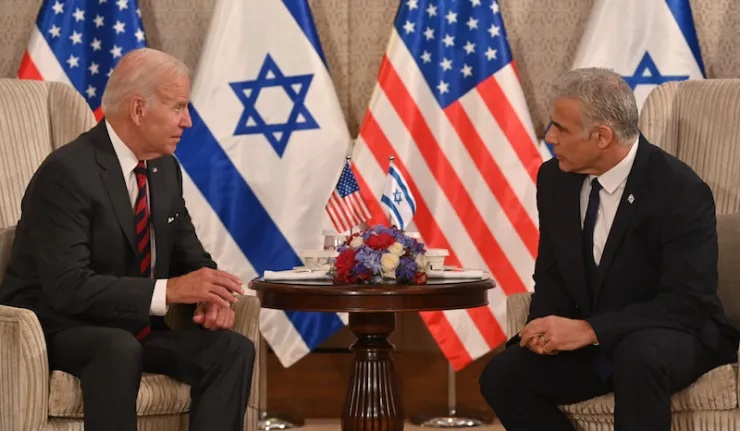 Israeli Prime Minister Yair Lapid and U.S. President Joe Biden in Jerusalem on July 14, 2022. (Image Credit: Kobi Gideon/GPO)
Israeli Prime Minister Yair Lapid and U.S. President Joe Biden in Jerusalem on July 14, 2022. (Image Credit: Kobi Gideon/GPO)
The declaration stated that the U.S. reiterates its steadfast commitment to never allow Iran to acquire a nuclear weapon as it poses a great threat to Israel’s security. The commitment was termed as an integral part of the pledge between the U.S. and Israel.
First I2U2 Summit
President Biden and Prime Minister Lapid participated in the first virtual I2U2 summit. Indian Prime Minister Narendra Modi and President of the United Arab Emirates Mohammad bin Zayed Al Nahyan participated in the meeting via virtual link.
The I2U2 (I2 stands for Israel and India while U2 stands for the U.S. and UAE) summit is being termed as another ‘Quad’ by many analysts. The I2U2 summit was focused on joint investment in six different areas including water, energy, transport, space, health, and food security.
U.S. President Joe Biden also highlighted the importance of mutual cooperation among all four nations as the need for time in order to tackle the growing problem of energy crisis around the world.
President Biden brought up the Russia-Ukraine war during the discussion by stating that the world is “dealing with the accelerating climate crisis, which is being felt here in the Middle East every single day; or growing food insecurity and volatile energy markets made worse by Russia’s brutal and unprovoked attack against its neighbor, Ukraine; or, as we’ve all experienced firsthand over the past two years, tackling the health security needs and economic fallout from a global pandemic.”
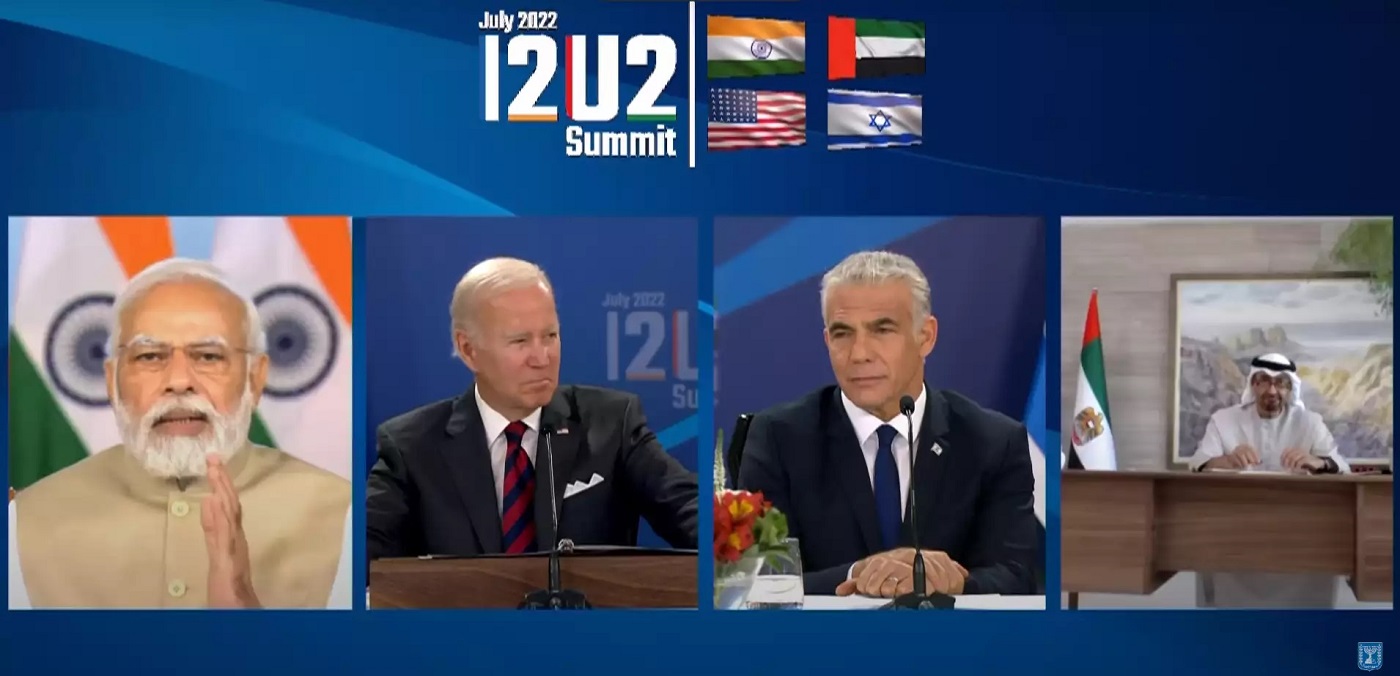 Leaders of India, the US, Israel, and the UAE at the I2U2 summit (Image Credit: Screenshot from Youtube/IsraeliPM/via IsraelHayom)
Leaders of India, the US, Israel, and the UAE at the I2U2 summit (Image Credit: Screenshot from Youtube/IsraeliPM/via IsraelHayom)
Biden’s visit to West Bank
During his second leg of the Middle East tour, U.S. President Joe Biden met with Palestinian President Mahmoud Abbas in Ramallah, West Bank. While alongside President Abbas, Biden said that the U.S. would not give up on the goal of achieving a just settlement for the decades-long Israel-Palestine conflict. Even if the ground is not right at this moment to restart negotiations, the United States and my administration will not give up on trying to bring the Palestinians, Israelis, and both sides closer together,” he said in his statement.
President Biden is an avid supporter of the two-state solution for the Israel-Palestine conflict. The Palestinian leadership, however, does not see the two-state solution to be a solid solution for their occupied land. President Abbas said that peace in the region can “begins with ending the Israeli occupation of our land.”
The Palestinian president said, “I am willing to extend an open hand to Israeli leaders so that we can bring peace to the region.” He further said that the if U.S.’s commitment to the two-state solution does not change, the window of resolution would narrow down between the two countries.
Biden’s visit to Saudi Arabia
As the third and final stop of his tour to the Middle East, President Biden arrived in the Saudi capital Jeddah through a historic flight from Tel Aviv. This was the first time that Saudi Arabian airspace was opened for a plane flying directly from Israel. Saudi Arabia and Israeli do not have any active diplomatic relations. Biden termed his flight from Tel Aviv to Jeddah as a small step toward normalizing the relations between Israel and Saudi Arabia, U.S.’s two most prominent allies in the Middle East.
Soon after Biden’s arrival in Jeddah, Saudi Arabia's General Authority of Civil Aviation announced it was lifting the restrictions over its airspace without discrimination, a decision that would allow direct flights to operate between Israel and Saudi Arabia. Biden released a statement commending the move. He stated that "Saudi Arabia's historic decision to open its airspace for all civilian planes, including those flying to and from Israel, is an important step towards building a more integrated and stable Middle East region.”
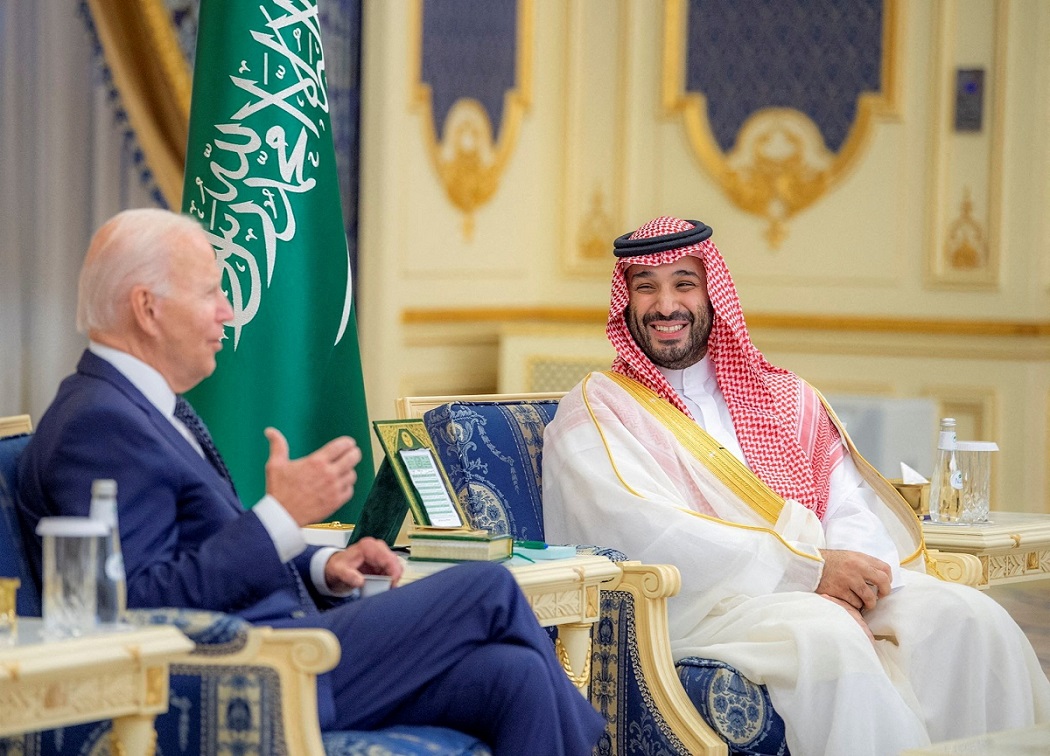 Saudi Crown Prince Mohammed bin Salman and U.S. President Joe Biden meet at Al Salman Palace upon his arrival in Jeddah, Saudi Arabia on July 15, 2022. (Image Credit: Reuters)
Saudi Crown Prince Mohammed bin Salman and U.S. President Joe Biden meet at Al Salman Palace upon his arrival in Jeddah, Saudi Arabia on July 15, 2022. (Image Credit: Reuters)
Meeting with Saudi Crown Prince Mohammad Bin Salman
Upon his arrival to the Kingdom, U.S. President Joe Biden met with Saudi Arabia’s Crown Prince Mohammad Bin Salman. President Biden, who once pledged to make Saudi Arabia "the pariah that they are" for their human rights violation, is now facing a lot of criticism over his trip to the Kingdom of Saudi Arabia.
During his election campaign back in 2019, Biden occasionally attacked Mohammad Bin Salman and the Saudi administration for their acts of human rights violation and especially for the murder of journalist Jamal Khashoggi., who was killed by Saudi agents in 2018 at the Kingdom’s consulate in Istanbul.
The White House has downplayed the President’s meeting with Mohammad Bin Salman. In an official statement released by the White House, it was stated that President Biden’s visit to Jeddah was focused on the Gulf Cooperation Council (GCC) meeting and the meeting with the Saudi Crown Prince was on the sidelines of the GCC meeting. The joint statement of the President’s visits to Jeddah stated that he visited the Kingdom on the invitation of the Custodian of the Two Holy Mosques, King Salman Bin Abdulaziz Al-Saud.
Meeting with Iraqi Prime Minister Mustafa Al-Kadhimi
President Joe Biden met with the Prime Minister of Iraq Mustafa Al-Kadhimi on the sidelines of the Gulf Cooperation Council meeting. President Biden and Prime Minister Al-Kadhimi also consulted on a range of regional issues. The leaders agreed that the relationship between the U.S. and Iraq is based on a shared interest in Iraq’s sovereignty, territorial integrity, security, and stability and committed to bolstering the bilateral partnership for the benefit of their two nations.
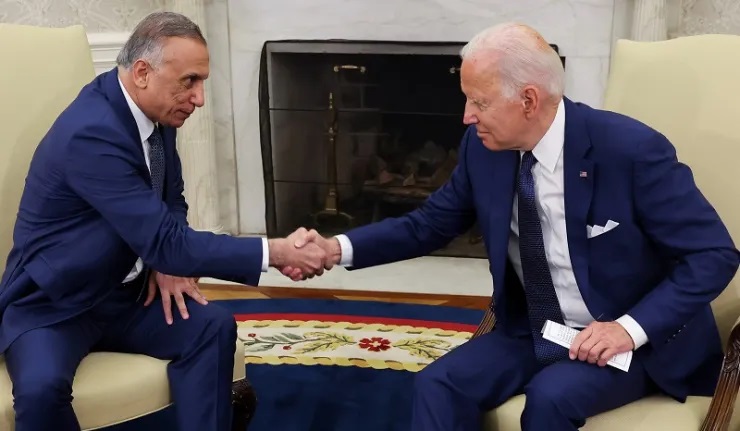 U.S. President Joe Biden with Iraq's Prime Minister Mustafa Al-Kadhimi. (Image Credit: Reuters/Evelyn Hockstein)
U.S. President Joe Biden with Iraq's Prime Minister Mustafa Al-Kadhimi. (Image Credit: Reuters/Evelyn Hockstein)
Gulf Cooperation Council Meeting
President Biden concluded his four-day trip to the Middle East by participating in the 2022 GCC summit which was attended by all members of the Gulf Cooperation Council including Bahrain, Kuwait, Oman, Qatar, Saudi Arabia, and the United Arab Emirates. Apart from the GCC members, leaders from Iraq, Jordan, and Egypt also joined the GCC meeting.
During his speech at the GCC summit, President Biden said that “for the first time since 9/11, an American President is visiting this region without American troops being engaged in a combat mission in the region.” He also said that the United States will look to “reassert” its role in the region.
President Biden’s first trip to the Middle East as president was of particular importance in the backdrop of the ongoing Russian invasion of Ukraine. The United States plans to eradicate Europe’s reliance on Russian gas imports and energy products by shifting the load towards the Middle East. Saudi Arabia being U.S.’s strongest ally in the region and once of the largest producer of petroleum in the world, is being seen as the first and foremost replacement of Russia for European energy needs. Hence, President Biden overlooked the issues of human rights violations in both Israel and Saudi Arabia in order to straighten the U.S. tied in the region and acquire energy products.
ALSO READ:
Regions
Issues

















 Amnesty International Report declares Israel an Apartheid State
Amnesty International Report declares Israel an Apartheid State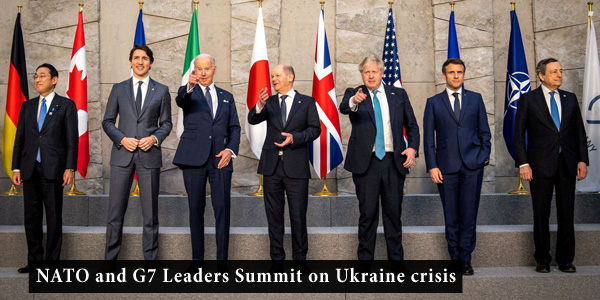 Highlights of NATO and G7 Leaders Summit on Ukraine Crisis
Highlights of NATO and G7 Leaders Summit on Ukraine Crisis







